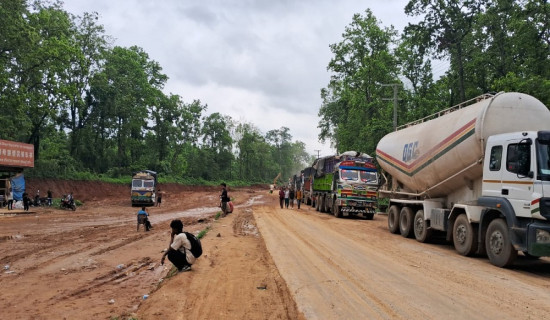- Monday, 23 June 2025
Check Alcohol Abuse
Writika Rijal
Alcohol consumption has been an age-old tradition in the Nepali society. It is deeply ingrained in the culture and is a common feature of social gatherings, festivals and ceremonies. However, the patterns of alcohol consumptions have changed over time, and alcohol abuse and addiction have become major health concerns in the country. There are three levels of alcohol consumption disorders: mild, moderate, and severe. Each category has its own distinct set of signs and potential drawbacks. If it is left unchecked, alcohol abuse in any form can spiral out of control.
Alcoholic beverages are available everywhere in the country. From little corner stores to dazzling liquor shops, such drinks are found in a huge quantity. According to a media report, 21 per cent males and 1.5 per cent females in the country consume alcohol. Due to an influence of the Western culture and modernisation in thinking of people, women have also been seen addicted to alcohol as much as men.
However, women who drink alcohol in public are often stigmatised, which can harm their reputation and position in society. In our society, any celebration demands a drink. If you are happy, you take a shot of tequila. If you are sad or depressed, you drink. If you do not drink on occasion or at a social gathering, you are labelled as ‘anomaly’. Studies have shown that alcohol usage is highly linked to violent behaviour, including physical violence, sexual assault, and domestic violence.
Alcohol consumption can lead to a range of health problems, including liver disease, cardiovascular disease, and cancer. The healthcare system may be burdened, and life expectancy may be decreased due to excessive consumption of alcohol. This also contributes to increasing the number of road accidents, especially in evenings. According to the Nepal Health Research Council (NHRC), the age-group between 15 and 69 years consume alcoholic beverages.
Alcohol abuse can also cause financial problems to families and individuals as the cost of alcohol can be a significant expense for those who struggle with addiction. There are some ethnic communities who use alcohol for various pujas, marriage ceremonies and festivals. The tradition of using alcohol also becomes a drawback in inter-caste marriages. Alcohol consumption can make it challenging for the family members of the couple to accept and support the inter-caste marriage. It may lead to a breakdown in communication and create tussles between partners which may further strain the relationship.
The government can strictly enforce laws related to the minimum age for alcohol consumption and launch public education campaigns to raise awareness about the negative effects of alcohol consumption. In Nepal, there are few rehabilitations centres that provide treatment and support services for individuals struggling with alcohol addiction including mediation and therapy and counselling.
The laws related to alcohol aim to regulate the production, distribution, and consumption of in order to minimise its negative impact on public health, safety, and social well-being. However, the enforcement of these laws remains a challenge, and there is still a significant problem with alcohol abuse in the country.

















